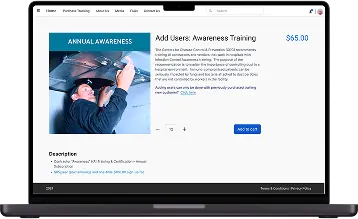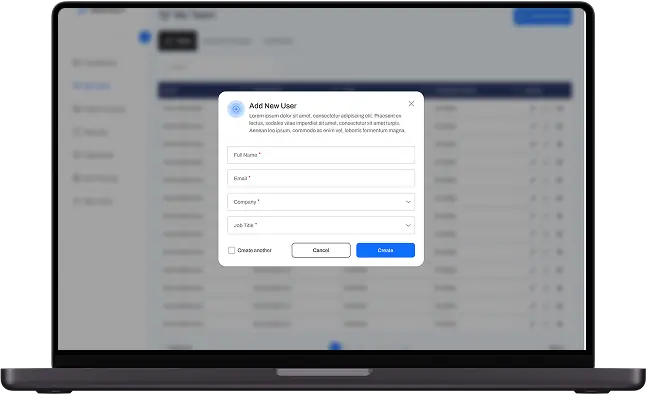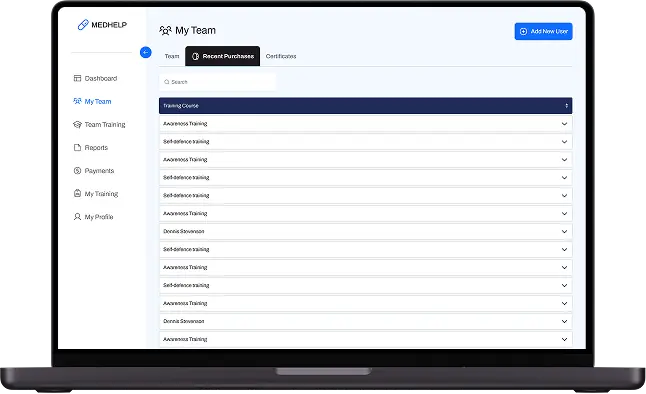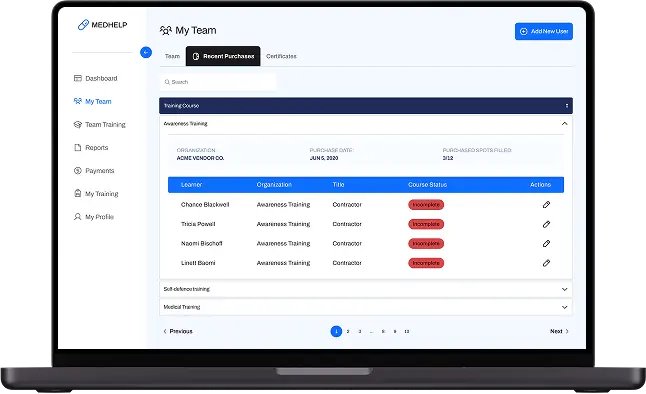Contractor Certification Management & Training
Happen Technologies designed a custom tailored LMS integrated into a Resource Management System, to enable seamless certification training, sales, and management.


Happen Technologies designed a custom tailored LMS integrated into a Resource Management System, to enable seamless certification training, sales, and management.


A client needed a Learning Management System (LMS) seamlessly integrated into their custom-built Resource Management System to host, sell, and manage contractor safety certifications. To achieve this, Happen Technologies partnered with the client’s web marketing agency for efficient collaboration.
While the marketing team focused on website development and advertising, Happen led the custom software discovery and implementation, delivering a tailored LMS solution that streamlined certification management and enhanced user experience.
The client initially needed their existing LMS integrated into their website with a member database to track user progress.
The system had to integrate with the customer’s existing e-commerce site.
As project requirements evolved, the client requested a custom-built LMS tailored to their industry needs.
A comprehensive platform was required to manage course purchases, user accounts, and progress tracking.
The client also realized a need for real-time certification verification to upgrade their manual badging service.
Designed a custom LMS that aligned with the client’s industry requirements.
Demonstrated an integrated user database for seamless progress tracking and management.
Developed a custom course purchasing flow and user management platform to enhance user experience and efficiency.
Designed multi-level administrative controls for secure and scalable management.
Prototyped a mobile badging service, allowing real-time certification verification via an app.
Architected the system with future scalability in mind, enabling easy feature expansion & integration with other business tools.
The Discovery Phase was crucial in laying the foundation for a robust and scalable Learning Management System (LMS) tailored to the client’s industry. Our team at Happen Technologies conducted an in-depth analysis of the existing system’s challenges and collaborated closely with stakeholders to define the ideal future state of their training and certification platform.
By the end of the Discovery Phase, we delivered a detailed project roadmap, including user personas, system architecture, and validated workflows. This allowed for a smooth transition into the design and development phases, ensuring a seamless and scalable LMS solution.
By the end of the Discovery Phase, we delivered a detailed project roadmap, including user personas, system architecture, and validated workflows. This allowed for a smooth transition into the design and development phases, ensuring a seamless and scalable LMS solution.
We designed a multi-layered management portal that enabled seamless report generation at every level of administration, ensuring efficient oversight and streamlined operations.
For contracting company employees, the platform provided a dedicated user portal, allowing them to log in, complete coursework, and monitor their certification status with ease. At the same time, company leadership had access to powerful tools to manage employee courses, track team progress, and oversee license renewals, ensuring compliance and operational efficiency.
Beyond individual companies, the system also supported client management at a higher level. Establishments like hospitals could efficiently manage contracting agencies and verify their certifications in real time, maintaining industry standards and safety compliance.
To further enhance usability, we ideated and prototyped a mobile badging service, allowing front desk personnel to scan contractor badges for instant certification verification. This feature streamlined access control and ensured that only certified contractors were permitted on-site.






The tech stack for this implementation included several major technologies. The core application was to be a .NET solution, hosted in Azure. The frontend for the Management Portal was Angular w/ WordPress and WooCommerce integrations for the existing E-commerce site and the Learning Management System.
Ultimately, this project was put on a long-term hold due to Covid’s impact on the client’s business. Just as the project was slated to begin the client took a large hit to ARR and had to shelve the plans of upgrading his technology. This, plus some health related issues in company leadership resulted in the solution never proceeding beyond small updates to the E-commerce site and additional marketing tweaks from our partnering agency.
We designed and prototyped a robust solution, a custom LMS that seamlessly integrated with the client’s e-commerce platform, and a cloud-hosted solution for optimizing course management, certification tracking, and employee progress monitoring. The system’s multi-layered administration ensured efficient oversight, while the mobile badging service enabled real-time certification verification, enhancing security and compliance. This scalable, user-friendly solution had the client and their team excited for long-term success in training and certification management. However, as mentioned above, the project was ultimately put on hold due to funds.
initial product discovery
iterative development
complex role management
The client initially wanted to integrate an existing LMS but later realized their industry needs required a tailored solution. A custom platform would allow for better tracking, purchasing, and certification management specific to user workflows - which ultimately, makes up the top value add of the client’s organization.
Our client worked directly with hospital systems around the US. An example is Cleveland Clinic in Cleveland, OH. Such large hospital networks have many large construction and/or cleaning contracts in place and our client improved these vendor relationships by providing a means of training, issuing and managing contractor safety certifications.
They lacked integration between their LMS, website, and member database. Tracking user progress, managing purchases, and verifying certifications were all manual and fragmented.